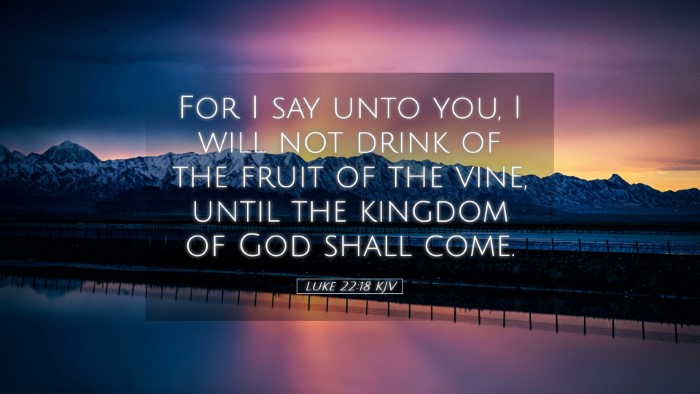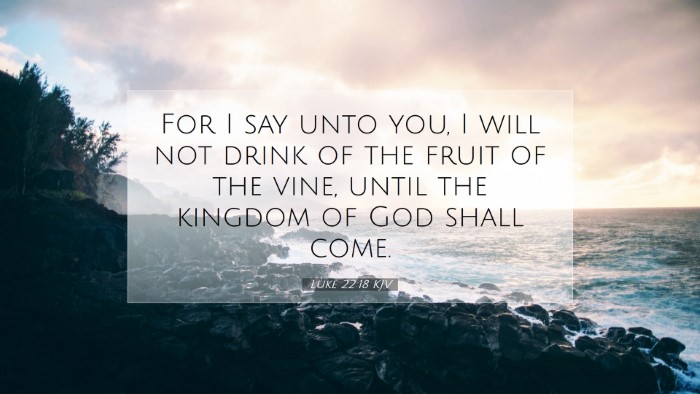Commentary on Luke 22:18
Text: "For I say unto you, I will not drink of the fruit of the vine, until the kingdom of God shall come."
Introduction
This profound statement by Jesus during the Last Supper encapsulates significant theological implications regarding the nature of the kingdom of God, sacrifice, and communion with believers. This commentary endeavors to merge insights from prominent public domain commentators such as Matthew Henry, Albert Barnes, and Adam Clarke, providing a holistic view suitable for pastors, students, theologians, and Bible scholars.
The Context of the Last Supper
The verse occurs in the context where Jesus shares the Passover meal with His disciples, marking a pivotal moment in redemptive history. Each action and utterance at this meal bears immense significance.
Matthew Henry's Insight
Henry emphasizes the importance of the Last Supper as a sacred institution, highlighting that it was an occasion for Jesus to prepare His disciples for the reality of His impending crucifixion. His abstention from the fruit of the vine symbolizes the sorrow of His forthcoming sacrifice.
Albert Barnes' Commentary
Barnes elaborates on the future aspect of Jesus’ statement regarding the “kingdom of God.” He argues that Jesus is affirming His commitment to ultimately partake in communion with His followers, an event that awaits the eschatological fulfillment of His kingdom.
Adam Clarke's Contribution
Clarke offers a rich historical backdrop, noting that the “fruit of the vine” represents the hopes and joys connected to the coming Messianic age. Clarke’s perspective sheds light on the Jewish understanding of the kingdom, infusing a contextual depth into Jesus's statement.
Exploration of Key Themes
-
The Kingdom of God:
Each commentator discusses the notion of the kingdom, which Jesus references. It speaks not only to the present reality of God’s reign but also anticipates the full realization of His kingdom at Christ’s second coming.
-
Communion and Sacrifice:
Jesus’ declaration signifies both the somberness and the hope inherent in this sacred meal. His future abstention highlights the sacrificial nature of His mission, aimed at the restoration of the relationship between God and humanity.
-
Symbolism of the Fruit of the Vine:
In the Jewish tradition, wine symbolizes joy, celebration, and covenant. The refusal to partake speaks to the tension of the impending crucifixion contrasted with the joy of the final banquet in the coming kingdom.
Theological Implications
This verse raises questions concerning the nature of communion among believers and Jesus Christ. Each interpretation draws attention to how the act of communion is not just a remembrance but a profound participation in the life and future of Jesus.
Matthew Henry's Theological Focus
Henry emphasizes the idea that believers are called to live in anticipation of Christ's return, thus enhancing the understanding of communion as a forward-looking act. Henry posits that participating in the Lord's Supper should evoke a sense of longing for this ultimate fellowship with Christ.
Albert Barnes' Eschatological Perspective
Barnes places significant emphasis on the eschatological context, noting that the absence of Jesus from the communal aspect of drinking wine illustrates a promise of future joy and celebration in the kingdom of God for all believers.
Adam Clarke's Comprehension of the Covenant
Clarke’s analysis reminds us that Jesus speaks of a new covenant, contrasting the old. This shift signifies a transformation in how God interacts with humanity, leading towards restoration and completion through Christ’s sacrifice.
Application for Believers
The message for contemporary believers is profound: our acts of communion link us not only to Christ’s sacrifice but also to His imminent return. Recognizing the weight of this verse encourages a deeper understanding of discipleship and communal worship.
Practical Reflections
-
Living in Expectation:
Believers are urged to live with a sense of expectation for the fulfillment of God's promises, mirroring the anticipation Jesus conveyed at the Last Supper.
-
Value of Community:
The communal aspect of the Lord's Supper emphasizes the necessity of community among believers as they await Christ’s return. This reflects our unity in Christ despite the trials faced in the present age.
Conclusion
Luke 22:18 is a rich verse that encapsulates themes of expectation, sacrifice, and the future kingdom. Insights from Matthew Henry, Albert Barnes, and Adam Clarke deepen our understanding, offering valuable perspectives for preaching, teaching, and personal reflection. By contemplating Christ’s anticipation of the kingdom, believers are invited to engage profoundly with their faith, looking forward to the ultimate fulfillment of God’s promises.


